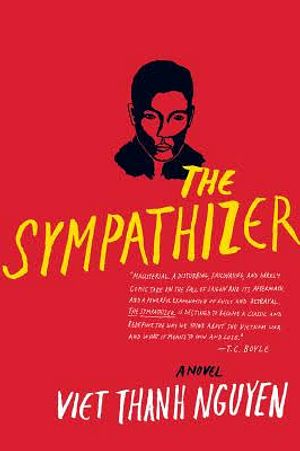This year’s Pulitzer Prize for fiction went to a rather unlikely contender: Viet Thanh Nguyen’s The Sympathizer, the story of a Vietnamese communist spy relocated with a general (The General) in the South Vietnamese Army to California following the fall of Saigon.
Just as the nameless narrator The Captain says at the beginning: I am a spy, a sleeper, a spook, a man two faces, The Sympathizer is a story of many parts. As Nguyen, an Associate Professor of English, American Studies and Ethnicity at the University of Southern California said in a recent interview with The Guardian, “My book has something to offend everyone.” His narrator, the bastard child of a poor Vietnamese maid and a French priest, notes that his best ability is to see anything from two sides.
There have been plenty of Vietnam War books over the years. Matterhorn, from the perspective of the U.S. soldier, was released to terrific reviews only a few years ago. However, little from the Vietnamese perspective has made a dent in the West. Take Bao Ninh’s The Sorrow of War or wartime doctor Tran Le Thuy’s recovered diary, Last Night I Dreamed of Peace: Both were written from a Northerner’s perspective of the war and have enjoyed acclaim but small audiences when translated into English. Something from a narrator who can see both sides of Vietnam’s long civil war is new, however.
The Sympathizer explores more complex ground, from the life a spy who feels genuine affection for those he spies upon, to resettling in America and the refugee’s experience. But that doesn’t do it much justice. The book doesn’t really attack American cultural mores, rather notions of what dominance does to one’s critical faculties: It reduces them. In an extended storyline the narrator becomes advisor to The Auteur (a backhanded homage to Francis Ford Coppola), who in making a film on the Vietnam War neglected to include a single Vietnamese voice (they speak in their own language in the script, or scream when tortured). Eventually parts are created for Vietnamese characters, allowing them to suffer more coherently, but not no more. Meanwhile, the pretentious, xenophobic platitudes of the fictional author of Asian Communism and the Oriental Mode of Destruction are ridiculed, as are people’s willingness to accept Western explanations of Vietnam over local ones (similar to The Quiet American’s Pyle looking for answers in his academic tomes and never the streets of Saigon). Lines such as the acerbic, “Oriental hocus pocus beloved by our department chair (of the university)” crop up. The Western fixation on a few frivolities of Asian culture (pointedly pan-Asian) in lieu of anything deeper is mocked. “Have you ever noticed,” says the Japanese-American Sofia Mori, “how a white man can learn a few words of some Asian language and we just eat it up?”
Later on in the book, however, now among the communists, one can see another example of how critical or independent thought are reduced by both dominance and dogma: American exceptionalism or communist victory matter little as ideology can always be seen from both sides, and then picked apart. Maybe a man without two faces is half blind?
But much of this depth only becomes apparent upon closer reflection. The story is so well paced that it is tempting to lose yourself in the unfolding story and its dramas – from LA’s streets to film sets in the Philippines or Vietnamese jungles – than the corruption ideology has on the spirit or the cauterizing effect of war and suffering on the life of the mind, or capacity for compassion.
It is unusual for a novel to do homage well (John Le Carre’s take on Graham Greene’s Our Man in Havana being an exception). Like the Tailor of Panama, The Sympathizer is a surreal, sometimes farcical spy novel, satirizing or referencing The Quiet American or Philip Roth (a memorable romantic interlude with a squid tentacle) and taking a steep Orwellian turn also. The Apocalypse Now interlude and its Hollywood hubris stands as one of the best parts of the book.
Nguyen may have wanted to offend everyone but he also didn’t want to have to distill things down for a Western audience. With a Pulitzer that hopefully will not be an issue again.

































